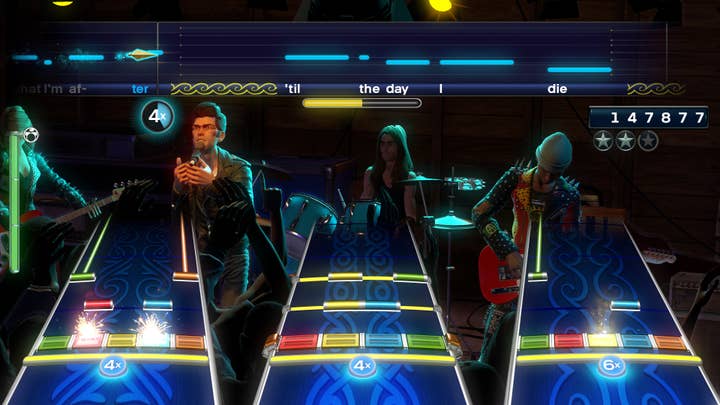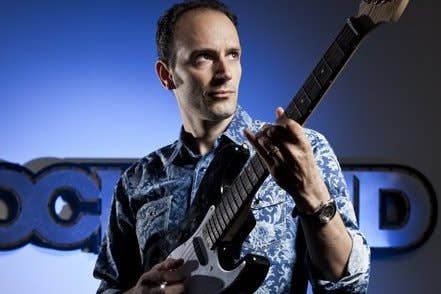Rock God: Alex Rigopulos
"I still have PTSD" says Harmonix creative director
It's been five years since the last Rock Band game, an interval that has seen a new generation of consoles arrives, Twitch become mainstream media for gamers and virtual reality hype to reach fever pitch. We spoke to Harmonix creative director Alex Rigopulos about why now was the right time for the franchise to make a return.
"First of all, it was really clear that everyone needed a break. The market needed a rest from the franchise. We needed a rest from the franchise. We needed some time to take stock," he explains.
"The most important factor, is that we didn't want to make the next title until we felt that we could really make the best game that we had ever made; that we had a vision for what Rock Band 4 was going to be, that made it worth making, really. At some point, more than a year ago, a vision coalesced that we, the team, could really rally behind. That was the moment where it suddenly made sense to swing hard for this."
Rigopulos also cites increased demand from fans who feel ready to dust off their guitars and drum kits, but there's also a whole new generation of gamer that missed out on the first wave of music games. So who are Harmonix targeting? Old rockers or new blood?
"Setting aside the question of age, already the Rock Band audience is highly variegated. You have players who play the game super casually just as a party experience. Then you have another group of players who are very much in it for the campaign, the career experience, the progression through the game. The third is the score chasers: hyper competitive players who really care about their score and they also really care about their score being better than your score.
"We view it almost as a kind of moral imperative to cross pollinate; to get people to listen and experience music in the game"
"These three groups really play the game for very different reasons and in different ways. We have to be thinking about how to attend to the needs of these different groups all the time as we're making decisions about the game."
The need to please these three groups goes deeper than marketing and feature sets, when a game is built around music.
"In terms of the soundtrack, which you asked about, it has always been the case, going all the way back to the earliest Rock Band, that we have tried to address an incredibly broad span of music," he says, pointing out that people can discover older or more obscure bands through the game. For instance an Elvis track will appear on Rock Band 4, the first time the king has featured in the franchise.
"We view it almost as a kind of moral imperative to cross pollinate; to get people to listen and experience music in the game that they might not otherwise be out there looking for."
As I speak to Alex in a hotel in San Francisco Twitchcon is taking place just around the corner, where people are happily performing to the crowd on a Rock Band 4 stand, but playing on Twitch is surely going to be a little more complicated?
"I mean we love this phenomenon and we would like to help accommodate it in any way we possibly can. To some degree, the console platforms themselves help accommodate those through various streaming infrastructure and what not. I think, for us, one of the complicating factors is always music rights," he says.
"So that's an ongoing discussion. And because it's an evolving landscape, I mean the rules and norms actually change with the weather at this point with respect to tech trends like this and music."
Of course Rock Band wouldn't be Rock Band with the plastic peripherals that currently fill your under stairs cupboard or haunt your attic. This time around Harmonix has partnered with Mad Catz for its range of peripherals, and Rigopulos is clearly grateful to be doing things differently this time around.

"It was just this epic slug-fest between MTV and Activision. They were both playing for to dominate that market. They were both trying to win. They both wanted commanding market share. It was just this slug-fest where both of them were trying to build as much inventory as possible to command the channel, you know the retail channels. That led to an oversupply situation that was kind of a financial nightmare at the end of the day for both parties."
He shakes his head.
"Thinking about that, I still have PTSD from that."
This time around the inventory will be more manageable, the costs controlled.
"There's not ambition or expectation that we will outsell Guitar Hero, that we're going up against Activision. But we don't need to. We can actually have a very healthy business serving a much more modest core, a small fraction of the people who played the game previously, and I think we're perfectly content to do that, which frees us from the need to manufacture seven million units of peripherals."
Harmonix also has a number of other projects in the works, including Amplitude which it funded with a Kickstarter campaign. The early access backers will get the games in December, the worldwide release will be in January. Rigopulos is positive about his crowdfunding experience, so positive in fact that Harmonix has just signed up with games focused funding platform Fig, with Rigopulos joining the advisory board.
"I am personally super hopeful about the Apple TV because I think it will be a perfect platform to serve that huge casual audience"
"I'm just rooting for the platform, because my hope is that it will, over time, increase the health and the size of the audience that is funding games. I think that is a great thing for independent game development, generally. So I wanted to get involved, in large part, to just do whatever I could to help the platform succeed."
And of course Harmonix has just this week revealed that it's received funding from Foundry Group and Spark Capital and is working on virtual reality projects, when GamesIndustry.biz spoke to Rigopulos it was a different device he wanted to talk about: Apple TV.
"Basically as soon as we learned that this platform was coming, we threw ourselves wholeheartedly at it," he says, though he can't tell me anything about the specifics of the project.
"Those casual players, they're not really being served in the living room right now. They've gone to mobile devices and what not. I think that's a giant missed opportunity so far. Actually I am personally super hopeful about the Apple TV because I think it will be a perfect platform to serve that huge audience. For us, as makers of music games, that casual audience usually responds really well to music games."

